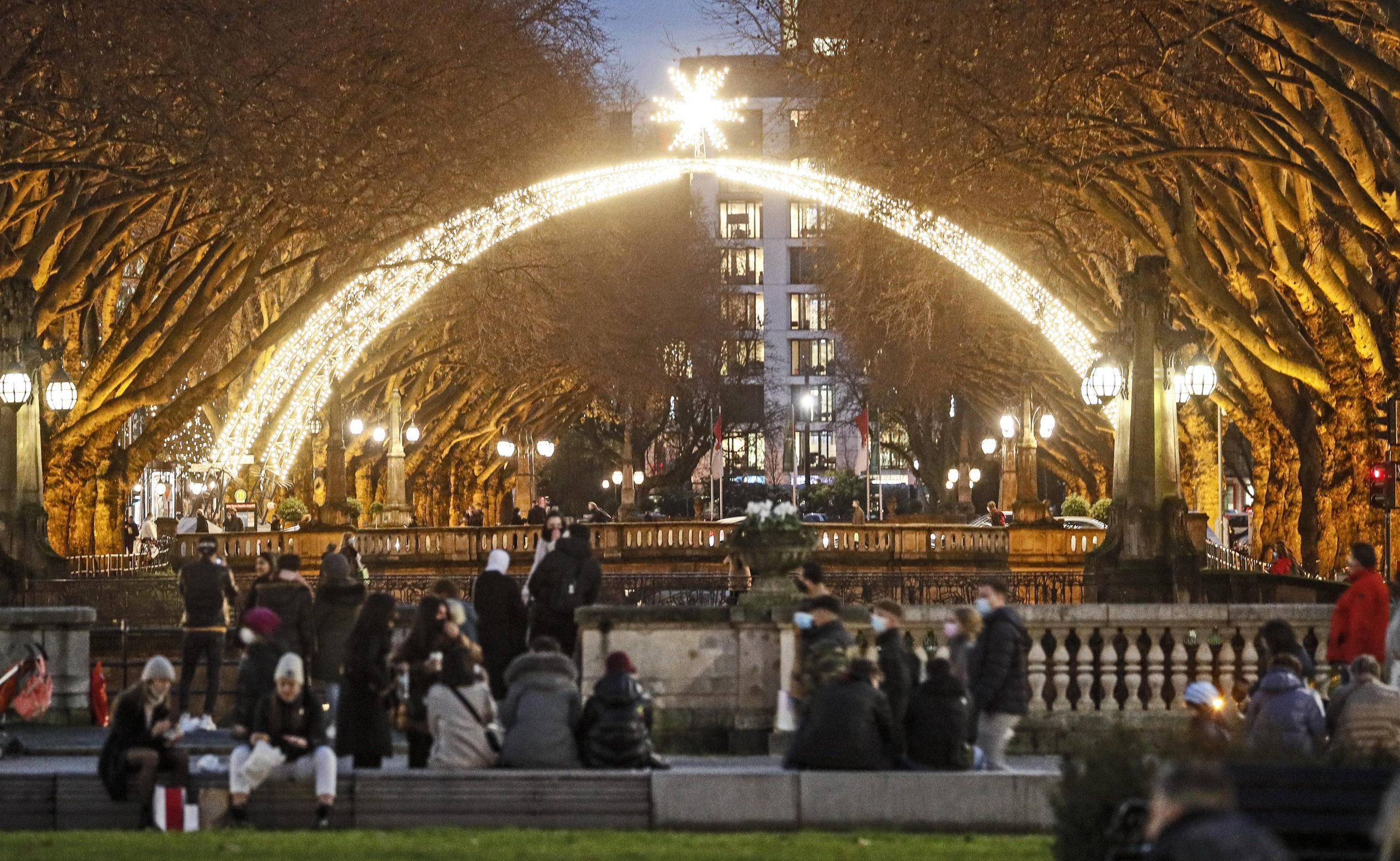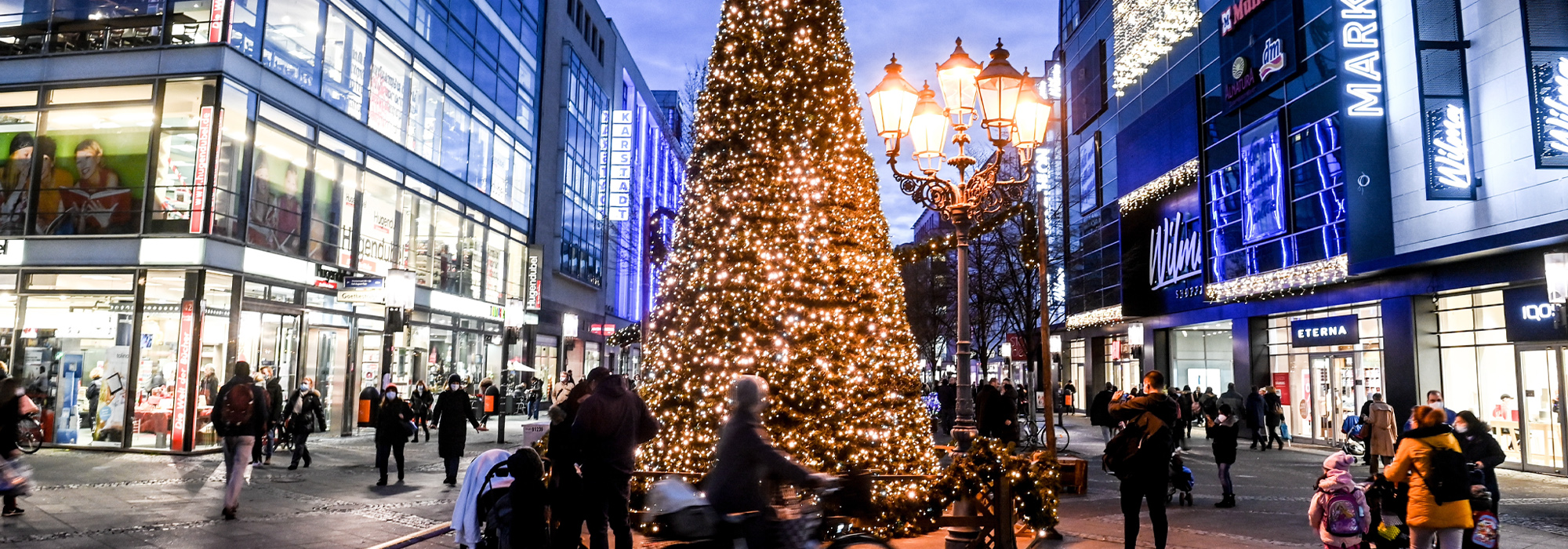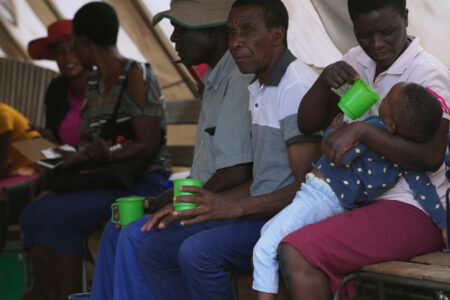
BERLIN – The sound of laughter erupts from a group buried under scarves and toques, gathered by the Landwehr Canal. Across the street another crew of revelers is gathered close, clutching mulled wine under twinkling lights outside a bar. This common scene on a mid-December night wouldn’t be a catalyst for national policy change in any other year than 2020.
“As hard as it is – I know how much love has gone into mulled wine stands and waffle stands – this is not compatible with the agreement we made to only take food away to eat at home,” Chancellor Angela Merkel said in an uncharacteristically impassioned speech in the Bundestag, Germany’s federal parliament, on Dec. 9. “I’m really sorry from the bottom of my heart, but if the price we pay is 590 deaths a day, then that is unacceptable in my view.”
Now, Christmas markets, eating at restaurants, cozying up in bars, and public drinking are forbidden activities in Germany. Four days after Merkel’s speech, the federal government and all 16 state governments tightened restrictions to manage the ever-growing infection numbers across the country. As of Dec.16, most retail stores closed, employers were encouraged to close offices or allow people to work from home, and New Year’s gatherings are forbidden.
Germany was widely applauded for its low death rates during the first wave of the pandemic, and has shown that you can have both a national strategy that makes the rules very clear across 16 states, and local strategies that can go further than the national response. Events that typically prompt mass cross-country travel like Christmas are one scenario in which a more centralized strategy can be key.
COVID-19 tests the Canadian federation
In Canada, a recent poll from Angus Reid showed about a third of Canadians surveyed were planning to see family outside their own household over the holidays. And while half of Canadians surveyed said they would typically travel outside their community or province for the holidays, 10 per cent are still planning to travel. But there is no pan-Canadian rule on whether this travel is permitted. Part of the reason for the lack of national rules around managing the pandemic is federalism – the provinces and federal government have largely respected what is in the other’s domain.
But Prime Minister Justin Trudeau was criticized last month for “imploring” premiers and mayors to take action against COVID-19 amid record numbers of infections. “This is a national crisis, not a series of provincial pandemics,” wrote Scott Gilmore in Maclean’s last month. “The mix-and-match policies being implemented across the country, triggered at different levels, applied in different ways, and communicated (or not) in different terms is failing.”
Charles Breton and Paisley Sim of the Centre of Excellence on the Canadian Federation mapped out the variation in each province’s response to the pandemic. They looked at measures like mask-wearing, showing some provinces with higher caseloads, like Alberta, had less stringent guidelines. Many have pointed out throughout the pandemic that the federal government isn’t powerless to implement national measures to manage a health crisis. There are at least two legal routes at Trudeau’s disposal to use if there were political will to do so – the emergency powers in the Constitution Act, and invoking the Emergencies Act. And beyond legal mechanisms, plain and simple cooperation is always an option.
Another federation manages a national response
While federalism is often blamed for this lack of coordination, other countries with federal systems, like Germany, have managed to design a national response.
And yet the German federal system isn’t more centralized than Canada’s – states, or länder as they are known locally, are quite independent from the federal government. But the response has been far more co-ordinated thanks to a long history of co-operation across states and between states and the federal government, says Jörg Broschek, an associate professor at Wilfrid Laurier University and expert in Canadian and German federalism.
There are three main points on a continuum for how federations function, Broschek explains. On one extreme is where all governments decide things unilaterally, the other is where joint decision-making is mandated, and in the middle lies co-operation. In any federation, a balanced approach is preferred, he adds, where “harmful unilateral action” – like invoking emergency powers – is avoided, while “rigid joint decision-making” is also avoided.
In Germany, joint decision-making is common, for instance, in the case of fiscal federalism, where the federal and state governments share two-thirds of all revenues, says Broschek.
“[Ideally] you find an incentive for them to come together voluntarily, but try to do it on an ongoing basis,” says Broschek. During the pandemic, this is the kind of co-operation he has seen in Germany.
The most visible point of co-operation has been regular federal-state conferences, like the one held most recently on Dec. 13. At these conferences, a consensus is reached on the national public health guidelines in an effort to curb infection rates, although states can take further action as their leaders see fit. During the first wave of the pandemic, for instance, Bavaria put in lockdown measures before the federal government did.
When emerging from the lockdown in May, regions were to reinstate restrictions if cases passed a certain threshold, 50 infections per 100,000 in the population. “If locally something happens, we won’t wait until it has spread through the whole republic … we will act locally,” Merkel said at the time.

National guidelines have been agreed upon for Christmas, but there’s still hope that households may be allowed to invite up to four members of their immediate family from other households, and any children under 14 if numbers improve.
Still, Berlin, one of three city-states in Germany, has indicated it will not loosen restrictions between Dec. 24 and Dec. 26. “Berlin has decided early on to approach the holidays with caution, not presenting the prospect of easing restrictions over Christmas,” said Dilek Kalayci, Berlin’s minister of health, in an email statement.
This is in line with Berlin’s decision in October to impose an 11 p.m. curfew on restaurants, bars and stores in an effort to slow its climbing infection rate. Berlin’s situation is vastly different from most states because of its size, density, and position in the middle of another state – Brandenburg. When Berlin’s mayor, Michael Müller, contemplated further restrictions on retail ahead of the national lockdown, he noted the city would have to co-ordinate with Brandenburg, where many shoppers come from.
Avoiding ambiguity through legal and political means
Beyond co-operation, there is a history of robust legal agreements that the German state and federal governments engage in to avoid ambiguity, says, Broschek. “This is something that you don’t find in Canada at all,” he adds. Agreements between provinces are rarely legally binding, he says, pointing to the Atlantic travel bubble. Broschek thinks it was a great example of co-operation, but adds it was simply a political agreement without an enforcement mechanism.
In Germany, there is a high degree of co-ordination between the federal government and states for two other reasons. First is the structure of Germany’s parliament. The main chamber is the Bundestag, which has representatives selected directly by the electorate, similar to the Canadian House of Commons. And the second chamber of government is the Bundesrat, which is comprised of state representatives not directly voted in, but chosen by their state. “It has real powers on some issues – it can sponsor national legislation and so on,” Johannes Saurer, professor of law at the University of Tubingen, said in an interview. “This gives incentives for co-operation between federal and state governments.”
Second, states are often responsible for implementing federal legislation, an example of administrative federalism. During the pandemic, a key piece of legislation in Germany has been the Infektionsschutzgesetz, or the Infection Protection Act. “There’s a built-in mechanism in the Infection Protection Act for the federal and state governments to co-operate,” says Saurer.
Enacted in 2000, the law has been amended twice this year, most recently in November, because it was originally designed for local outbreaks of disease, and did not contemplate the potential for constitutional rights like freedom of assembly to be curtailed in efforts to constrain a pandemic.
But even with this law, Saurer says “the co-operation in the case of COVID-19 is more political than legal.” He points to the common guidelines agreed to by the states and federal government – they are guidelines, and not legally-binding measures.
What this means is that even in the face of a history of co-operation and administrative federalism, co-ordination during the pandemic is still greatly impacted by political will in Germany. While Germany excelled in containing the virus in the first wave, its second lockdown is widely seen as having come too late – one side effect of negotiating measures between 17 governments.
But even if it’s seen as too late to prevent the damage of the record death rate seen in Germany in December, the continual co-operation between Germany’s 17 governments allowed for a forum to agree upon nationwide rules ahead of the holidays. In Canada, there’s simply no mechanism to do the same. And in either scenario, political will is required for action.
“My main concern with many Canadian provincial governments is really the lack of action,” says Broschek, noting experts urged leaders to take action in September to avoid the infection spikes seen in Canada today. “That’s a political thing and has nothing to do with federalism.”
Photo: Berlin’s major shopping street, Wilmersdorfer St., on Dec. 14, 2020. EPA/FILIP SINGER









